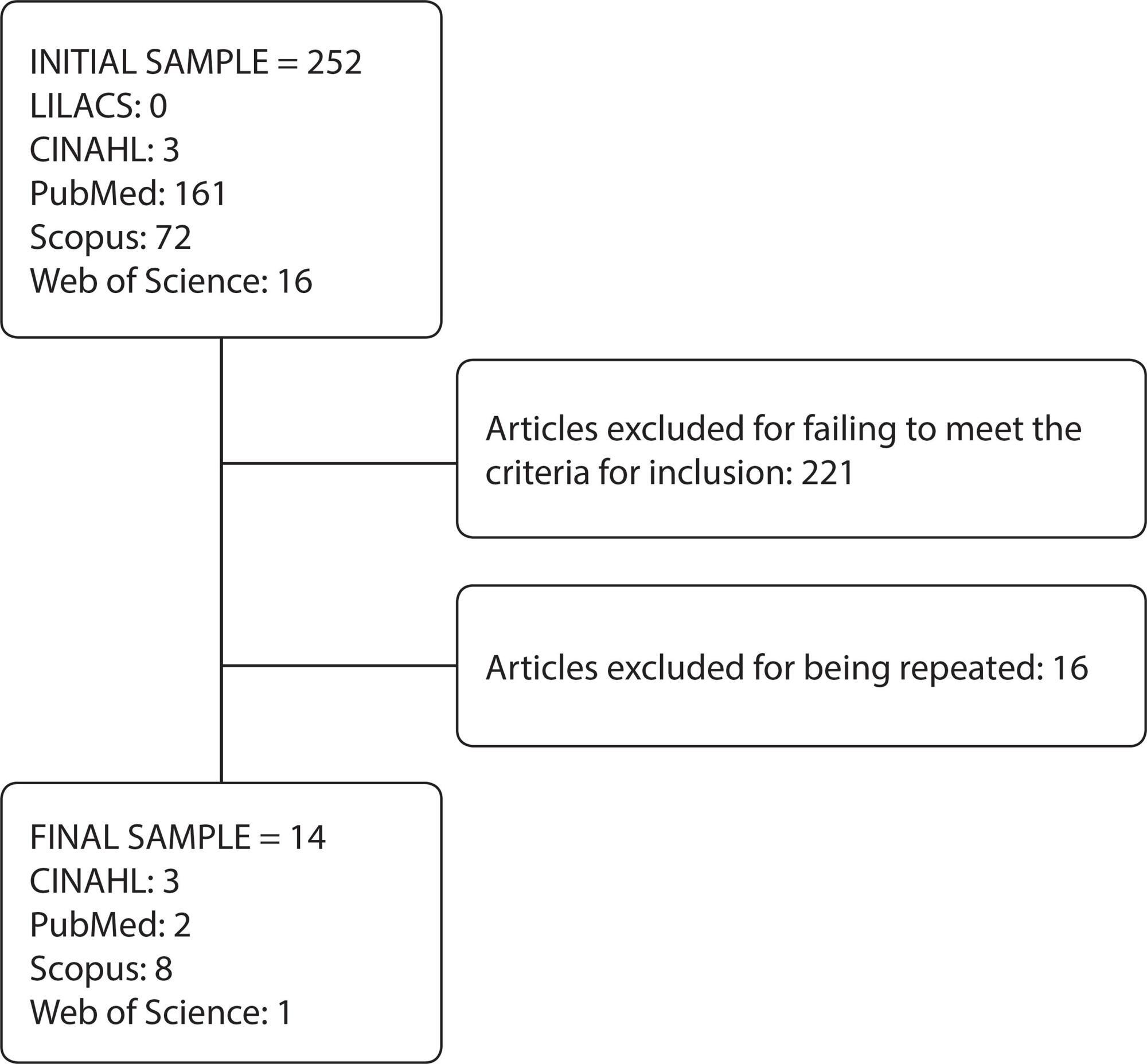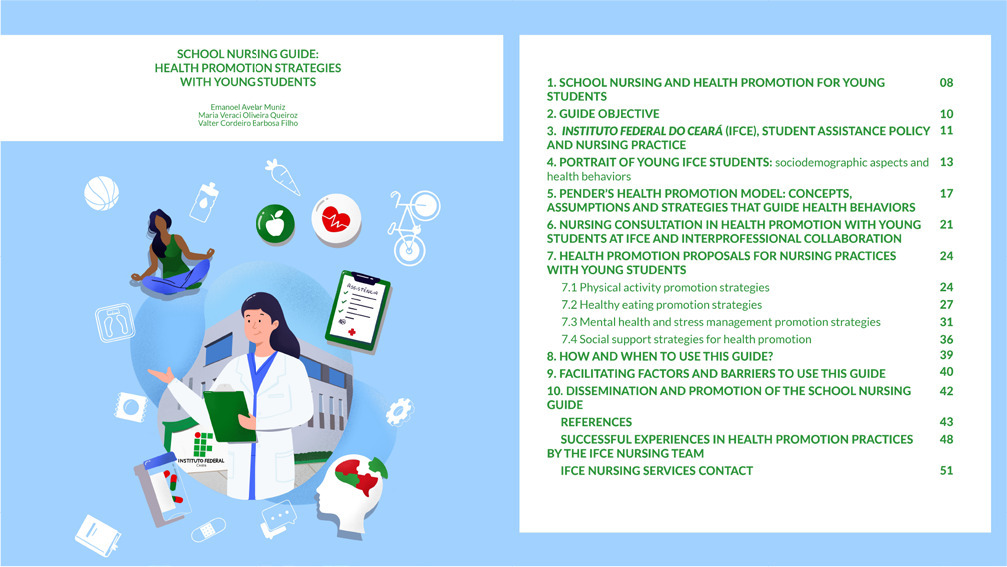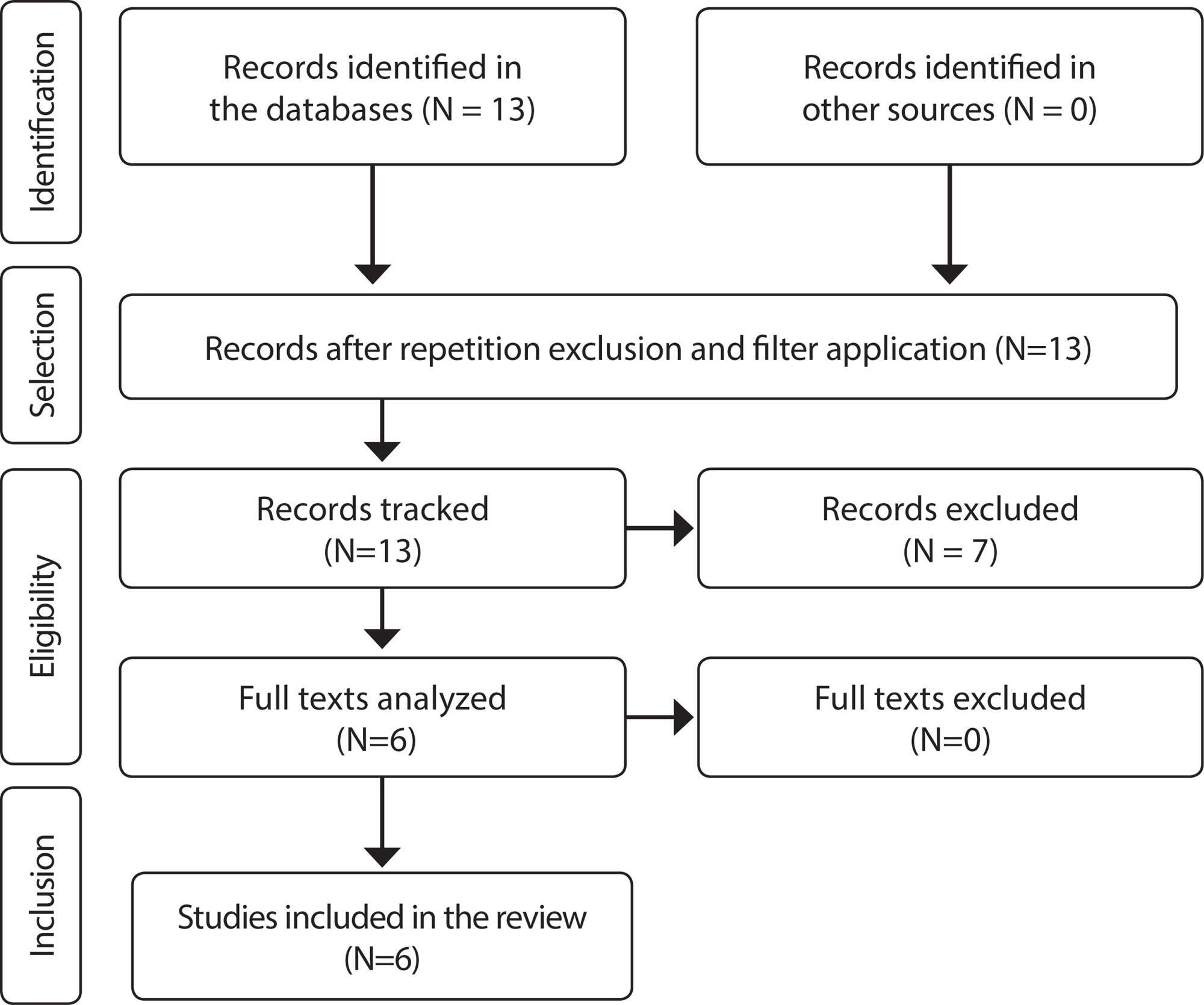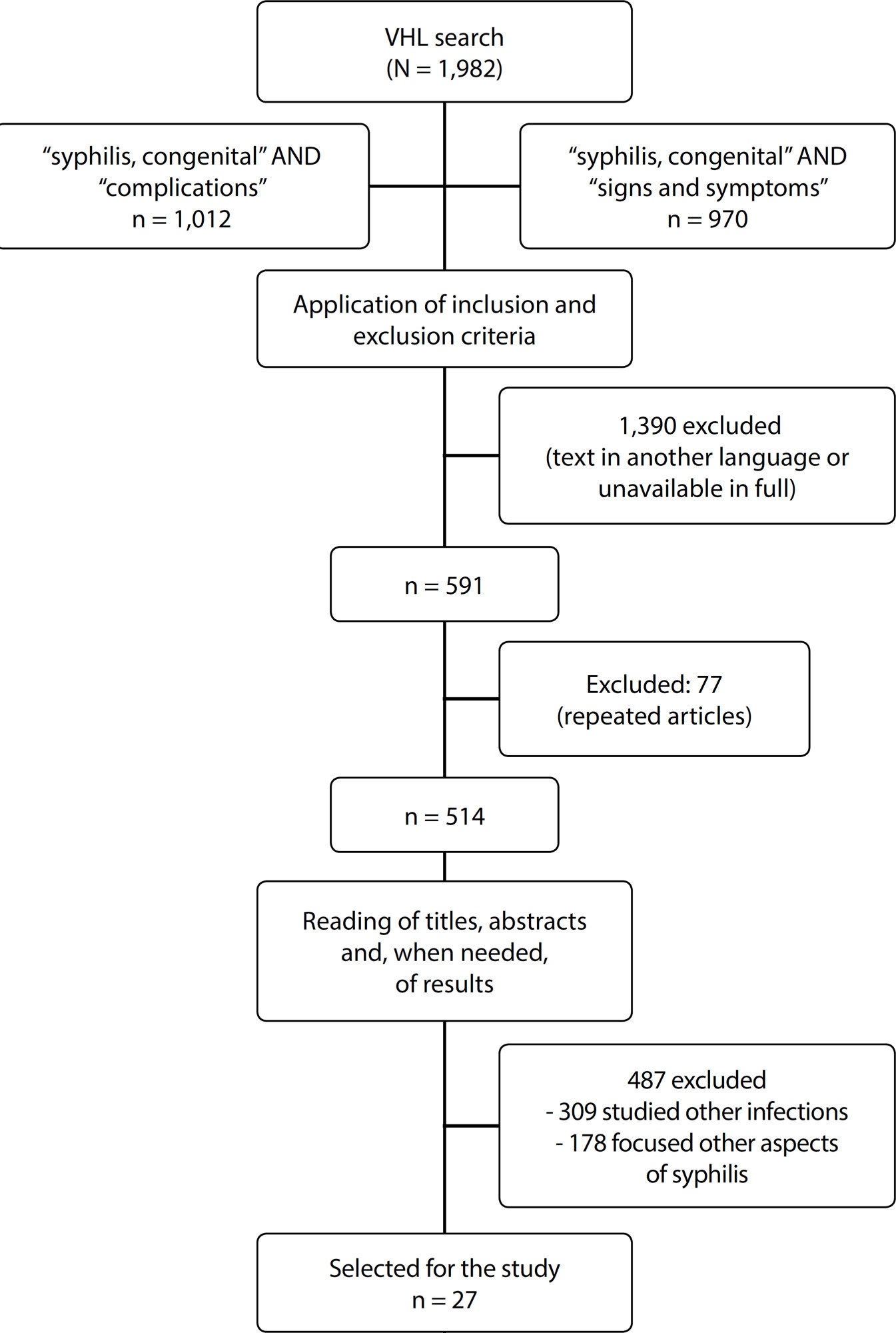-
RESEARCH01-01-2016
Factors associated with the occurrence of adverse events in critical elderly patients
Revista Brasileira de Enfermagem. 2016;69(6):1039-1045
Abstract
RESEARCHFactors associated with the occurrence of adverse events in critical elderly patients
Revista Brasileira de Enfermagem. 2016;69(6):1039-1045
DOI 10.1590/0034-7167-2016-0199
Views0See moreABSTRACT
Objective:
to identify the factors associated with the occurrence of adverse events in critical elderly patients admitted to intensive care unit according to demographic and clinical characteristics.
Method:
a retrospective cohort study was conducted in nine units of a teaching hospital. Data were collected from medical records and from monitoring of nursing shift change. We used the t-test/Mann-Whitney, chi-square and logistic regression to test associations. Significance level of 5% was used.
Results:
out of the 315 elderly, 94 experienced events. Those who experienced events were men (60.6%) with mean age of 70.7 years, length of hospital stay of 10.6 days and survivors (61.7%). Most of the 183 events were clinical processes and procedures (37.1%). There was an association between adverse event and length of hospital stay in the unit (p=0.000; OR=1.10, 95% CI [1.06, 1.14]).
Conclusion:
the identification of associated events and factors in the elderly subsidize the prevention of these occurrences before the vulnerability of this age group.
-
RESEARCH01-01-2016
Challenges to implementation of advance directives of will in hospital practice
Revista Brasileira de Enfermagem. 2016;69(6):1031-1038
Abstract
RESEARCHChallenges to implementation of advance directives of will in hospital practice
Revista Brasileira de Enfermagem. 2016;69(6):1031-1038
DOI 10.1590/0034-7167-2016-0085
Views0See moreABSTRACT
Objective:
to understand the difficulties and limitations in the implementation of advance directives of will in the hospital context.
Method:
qualitative, exploratory and descriptive study conducted by means of semi-structured interviews with nurses, resident physicians and family caregivers. The data were analyzed by using discursive textual analysis based on the framework of bioethics principles.
Results:
the following categories emerged: Terminality as an expression of loss and cure as an option for care; concerns about legal implications; advance directives of will demand patient autonomy and proper communication.
Conclusion:
limitations and difficulties in practice of advance directives of will from the perspective of the participants show, apart from countless conflicts and dilemmas regarding end-of life matters, that impending death experiences obstruct patients’ wishes.
-
RESEARCH01-01-2016
Experience and coping strategies in relatives of addicts
Revista Brasileira de Enfermagem. 2016;69(6):1024-1030
Abstract
RESEARCHExperience and coping strategies in relatives of addicts
Revista Brasileira de Enfermagem. 2016;69(6):1024-1030
DOI 10.1590/0034-7167-2015-0044
Views0See moreABSTRACT
Objective:
to understand the experience and coping strategies in relatives of drug addicts.
Method:
a study was developed with 87 relatives of addicts, registered in two Basic Health Units. The focus group was used as the study method, and content analysis was applied.
Results:
four categories were chosen: perception of relatives about the drug addiction of their family members; feelings and attitudes related to being a relative of an addict; difficulties found in the process; and, coping strategies. The findings reflected the difficulty when mentioning the subject, and the need of being cared for. Relatives believed that the addict needs to have the will to get into treatment, and they faced challenges in dealing with sporadic disappearances. They pointed to feelings of pity, impotence, disgust, hate, shame, fear of aggressiveness, and humiliation.
Conclusion:
the biggest difficulties were dealing with relapses, and the lack of public resources. Religiosity and faith, isolation and advice were used as coping strategies; ambivalence in thoughts and attitudes was demonstrated.
-
RESEARCH01-01-2016
Leadership and cooperation: 25 years of mission as a WHO collaborating center
Revista Brasileira de Enfermagem. 2016;69(6):1017-1023
Abstract
RESEARCHLeadership and cooperation: 25 years of mission as a WHO collaborating center
Revista Brasileira de Enfermagem. 2016;69(6):1017-1023
DOI 10.1590/0034-7167-2016-0058
Views0See moreABSTRACT
Objective:
analyse the evolution in the mission and vision of a World Health Organization Collaborating Centre in Nursing in Brazil in the context of the implementation of its terms of reference.
Method:
Historical-social documentary research with a qualitative approach.
Results:
During the 25 years of its activities as a Collaborating Centre, its mission to “promote and stimulate the development of nursing research in the region, with a focus on Latin America” triggered activities in the context of its terms of reference in four areas: Human Resource Formation for Research, Knowledge Production, Knowledge Dissemination, Encouragement of Exchange and Stimulus of Partnerships.
Conclusion:
The activities developed were consolidated through the strengthening of Brazilian and international partnerships, further stimulated by the five redesignations of the Collaborating Centre in the period analysed. Thus, its vision of becoming leader and driving agent of innovations in the academic, care and political context of nursing could be put in practice.
-
EDITORIAL01-01-2016
ABEn 90 anos e a Revista Brasileira de Enfermagem
Revista Brasileira de Enfermagem. 2016;69(6):1011-1012
Abstract
EDITORIALABEn 90 anos e a Revista Brasileira de Enfermagem
Revista Brasileira de Enfermagem. 2016;69(6):1011-1012
Views0Neste número temático, celebramos os 90 anos da Associação Brasileira de Enfermagem (ABEn), ao mesmo tempo em que comemoramos a criação e manutenção da primeira revista científica de enfermagem do Brasil, que, desde 1932, despontou trazendo luz para a produção do conhecimento e a constituição do que é a enfermagem no Brasil atual.A ABEn, como […]See more -
EDITORIAL01-01-2016
ABEn 90 years and the Brazilian Journal of Nursing
Revista Brasileira de Enfermagem. 2016;69(6):1011-1012
Abstract
EDITORIALABEn 90 years and the Brazilian Journal of Nursing
Revista Brasileira de Enfermagem. 2016;69(6):1011-1012
Views0In this special edition, we celebrate 90 years of the Brazilian Nursing Association (ABEn), at the same time in which we celebrate the creation and maintenance of the first scientific nursing journal in Brazil. Emerging in 1932, it has shone a light on the production of knowledge and the constitution of nursing in Brazil today.As […]See more -
ERRATUM01-01-2016
ERRATUM
Revista Brasileira de Enfermagem. 2016;69(5):1003-1003
Abstract
ERRATUMERRATUM
Revista Brasileira de Enfermagem. 2016;69(5):1003-1003
DOI 10.1590/0034-7167.20166905e02
Views1Article “Association between self-care and hospital readmissions of patients with heart failure”, with number of DOI: 10.1590/0034-7167.2016690312i, published in the journal Revista Brasileira de Enfermagem, v69(3):469-74, page 469 that read:“Amanda Chlalup LinnI, Karina AzollinII,III, Emiliane Nogueira de SouzaII,IV“.[…]See more -
ERRATUM01-01-2016
ERRATUM
Revista Brasileira de Enfermagem. 2016;69(5):1002-1002
Abstract
ERRATUMERRATUM
Revista Brasileira de Enfermagem. 2016;69(5):1002-1002
DOI 10.1590/0034-7167.20166905e01
Views0Article “Alcohol and alcoholism: attitudes of nursing students”, with number of DOI: http://dx.doi.org/10.1590/S0034-71672013000100013, published in the journal Revista Brasileira de Enfermagem, v66(1):84-9, page 89 that read:“18. Miranda SP, Vargas D. Satisfação de pacientes de um centro de atenção Psicossocial álcool e drogas com o atendimento do enfermeiro. SMAD, Rev Eletrônica Saúde Mental Alcool Drog 2019;5(2):1-15”.[…]See more
-
ERRATUM01-15-2024
ERRATUM
Revista Brasileira de Enfermagem. 2024;77(1):e2024n1e01
Abstract
ERRATUMERRATUM
Revista Brasileira de Enfermagem. 2024;77(1):e2024n1e01
DOI 10.1590/0034-7167.20247701e01
Views1In the article “The ethics of nursing care for transgender people”, with DOI number: , published in Revista Brasileira de Enfermagem, 2023;76(Suppl 3):e20220797, in authorship:Where it read:[…]See more -
ORIGINAL ARTICLE03-19-2021
Mobile application of the Terminology Subset for Coping with Domestic Violence Against Children
Revista Brasileira de Enfermagem. 2021;74:e20200287
Abstract
ORIGINAL ARTICLEMobile application of the Terminology Subset for Coping with Domestic Violence Against Children
Revista Brasileira de Enfermagem. 2021;74:e20200287
DOI 10.1590/0034-7167-2020-0287
Views1See moreABSTRACT
Objective:
to describe the development of a mobile application for the International Classification Terminology Subset for Nursing Practice for Coping with Domestic Violence Against Children.
Methods:
an applied research of technological development, based on the Analysis, Design, Development, Implementation and Evaluation model and on the terminological subset based on the Theory of Nursing Praxis Intervention in Collective Health framework.
Results:
the application is divided into: 1) “Definition”: characterizes the phenomenon of violence against children; 2) “Assistance”: electronic record of nursing care; 3) “Diagnosis Consultation”; 4) “Intervention Consultation”: nursing diagnoses, outcomes, and interventions related to children and their families, subdivided into Strengthening and Weariness group.
Final considerations:
built from scientific research, the application has the potential to support nursing care, presenting, in an organized and systematic manner, nursing diagnoses, outcomes, and interventions, in addition to enabling the registration of cases under monitoring.

-
Evolution of nursing teaching in the use of education technology: a scoping review
Revista Brasileira de Enfermagem. 2021;74:e20200422
Abstract
Evolution of nursing teaching in the use of education technology: a scoping review
Revista Brasileira de Enfermagem. 2021;74:e20200422
DOI 10.1590/0034-7167-2020-0422
Views1See moreABSTRACT
Objective:
To identify and map the technological tools of information and communication to support the teaching learning process in Nursing teaching courses.
Methods:
This is a scoping review whose search was carried out in seven databases and in grey literature. After an initial analysis of the selection, 88 texts were read integrally, and 29 made up the final sample.
Results:
Virtual learning environment and object, simulation, hypermedia, and software or cellphone applications were the tools the nursing professors used the most. Studies highlight that the application of technology was important in the teaching-learning process, since it encouraged teaching based on safe care, motivating and developing abilities/competences, supported on significant, effective, flexible, and autonomous learning.
Conclusion:
The contribution of the technology for nursing formation stands out, but it should be highlighted that its employment must be critical, reflective, based on pedagogical theories and developed by trained professors.

-
ORIGINAL ARTICLE10-01-2022
Self-care of elderly people with diabetes mellitus and the nurse-patient interpersonal relationship
Revista Brasileira de Enfermagem. 2022;75(1):e20201257
Abstract
ORIGINAL ARTICLESelf-care of elderly people with diabetes mellitus and the nurse-patient interpersonal relationship
Revista Brasileira de Enfermagem. 2022;75(1):e20201257
DOI 10.1590/0034-7167-2020-1257
Views1INTRODUCTIONChronic non-communicable diseases are the main causes of death and health problems in the world, causing about 41 million deaths each year, which corresponds to approximately 71% of all deaths. Among these diseases, diabetes mellitus has stood out due to the increase in its incidence and prevalence().Estimates indicate that 463 million people live with diabetes […]See more -
ORIGINAL ARTICLE09-24-2022
Nurses’ performance in palliative care: spiritual care in the light of Theory of Human Caring
Revista Brasileira de Enfermagem. 2022;75(1):e20210029
Abstract
ORIGINAL ARTICLENurses’ performance in palliative care: spiritual care in the light of Theory of Human Caring
Revista Brasileira de Enfermagem. 2022;75(1):e20210029
DOI 10.1590/0034-7167-2021-0029
Views1See moreABSTRACT
Objectives:
to analyze nurses’ role in assisting patients in palliative care, with emphasis on the spiritual dimension, in the light of Theory of Human Caring.
Methods:
this is an exploratory, qualitative study, carried out in a hospital in João Pessoa, Paraíba, between August and December 2019, with 10 nurses. For data collection, semi-structured interviews were used. For analysis, we opted for content analysis.
Results:
the spiritual dimension of care is contemplated by several religious and spiritual practices. These are respected and encouraged by nurses, although there is difficulty in providing care for the spiritual dimension.
Final Considerations:
nurses have attitudes consistent with Jean Watson’s Theory and apply the Caritas Process elements during assistance to patients’ spiritual dimension in palliative care.
-
ORIGINAL ARTICLE03-27-2023
Adaptation and validation of an adult patient classification instrument with emphasis on the family dimension
Revista Brasileira de Enfermagem. 2023;76(2):e20220530
Abstract
ORIGINAL ARTICLEAdaptation and validation of an adult patient classification instrument with emphasis on the family dimension
Revista Brasileira de Enfermagem. 2023;76(2):e20220530
DOI 10.1590/0034-7167-2022-0530
Views1ABSTRACT
Objectives:
to adapt and validate an instrument for classifying adult patients that emphasizes the family support network in the demand for nursing care.
Methods:
methodological study, carried out in three phases: adaptation of an instrument considering the reality of adult patients; content validation with seven experts and assessment of measurement properties (construct validity and internal consistency) with 781 hospitalized patients.
Results:
in content validation, the indicators reached the values established for the Content Validity Index (0.85-1.00). In the confirmatory factor analysis, the 11 indicators were distributed in three domains and presented average variance extracted and factor loading greater than 0.5. Composite reliability was greater than 0.7.
Conclusions:
the present study adapted and made available, with evidence of validity and reliability, an instrument for classifying adult patients that considers the family support network in the demand for nursing care.
Keywords:Factor AnalysisFamilyHospital Organization and AdministrationPatient-Centered CareValidation StudiesSee more
-
ORIGINAL ARTICLE04-14-2023
Guide for Systematization of Care and Nursing Process: educational technology for professional practice
Revista Brasileira de Enfermagem. 2023;76:e20210975
Abstract
ORIGINAL ARTICLEGuide for Systematization of Care and Nursing Process: educational technology for professional practice
Revista Brasileira de Enfermagem. 2023;76:e20210975
DOI 10.1590/0034-7167-2021-0975
Views1ABSTRACT
Objective:
to elaborate and validate the content of a digital guide educational technology on Systematization of Nursing Care and Nursing Process.
Methods:
applied research of technological development, developed between 2020 and 2021, in three steps. First, a scoping review was carried out to elaborate the content. In the second step, the content was validated with 46 nurse judges selected for convenience. The minimum criterion of agreement among judges was 80%. The third step consisted of content organization and layout.
Results:
the guide content was elaborated from the Federal Nursing Council legislation, scientific articles and textbooks. Content was considered appropriate, relevant and organized by judges.
Final considerations:
the digital guide is an alternative that can contribute to the NP execution and implementation, supporting the planning and implementation of actions for quality of care.
Keywords:Educational TechnologyNursing ProcessNursing RecordsProfessional PracticeStandardized Nursing TerminologySee more
-
ORIGINAL ARTICLE12-16-2024
The nursing practice environment and hospital sociotechnical complexity: a mixed-methods study
Revista Brasileira de Enfermagem. 2024;77(6):e20230315
Abstract
ORIGINAL ARTICLEThe nursing practice environment and hospital sociotechnical complexity: a mixed-methods study
Revista Brasileira de Enfermagem. 2024;77(6):e20230315
DOI 10.1590/0034-7167-2023-0315
Views1See moreABSTRACT
Objectives:
to analyze the relationship between the nursing practice environment and hospital sociotechnical complexity as perceived by nurses.
Methods:
a sequential explanatory mixed-methods study was conducted in a hospital in southern Brazil. The Brazilian version of the Practice Environment Scale-Nursing Work Index and the Complexity Characterization Questionnaire were administered to 132 nurses. Subsequently, semi-structured interviews were conducted with 18 participants, and the data were subjected to thematic analysis. Data integration was achieved through a connection approach.
Results:
the nursing practice environment was found to be favorable, except in the subscale concerning Staffing and Resource Adequacy, where complexity was present in the activities. The three emerging categories explained human and technical aspects related to complexity in the practice environment, quality of care, and patient safety. Unexpected variability was inversely correlated with the practice environment.
Conclusions:
the study results indicate a relationship between these constructs, with implications for the quality and the safety of care.

-
ORIGINAL ARTICLE12-07-2020
Sarcopenia screening in elderly in primary health care: nurse knowledge and practices
Revista Brasileira de Enfermagem. 2020;73:e20200421
Abstract
ORIGINAL ARTICLESarcopenia screening in elderly in primary health care: nurse knowledge and practices
Revista Brasileira de Enfermagem. 2020;73:e20200421
DOI 10.1590/0034-7167-2020-0421
Views0See moreABSTRACT
Objective:
Describe the knowledge and practices of the Primary Health Care nurse on sarcopenia screening in the elderly.
Methods:
Qualitative study conducted with 24 Primary Health Care nurses. The data was collected through semi-structured interviews, recorded and later transcribed. The speeches were grouped in thematic categories, later analyzed, supported by Paulo Freire’s reference.
Results:
The findings showed that the primary care nurses’ knowledge of sarcopenia screening in the elderly was incipient and fragile. This reality is reflected in a gap in practice, although some instruments already require the registration of characteristics indicative of sarcopenia, such as the evaluation of the calf circumference.
Final Considerations:
The need to train nurses to perform sarcopenia screening and to implement a promotional and preventive care plan, which will result in improving the quality of life of the elderly assisted in Primary Care, was highlighted.
-
ORIGINAL ARTICLE03-30-2020
Stomized children care practices: narratives of relatives
Revista Brasileira de Enfermagem. 2020;73(2):e20180370
Abstract
ORIGINAL ARTICLEStomized children care practices: narratives of relatives
Revista Brasileira de Enfermagem. 2020;73(2):e20180370
DOI 10.1590/0034-7167-2018-0370
Views0See moreABSTRACT
Objectives:
to understand the practices adopted by relatives regarding ostomized children care.
Methods:
qualitative approach, conducted with 11 relatives of ostomized children. Methodological framework was used as narrative technique; NVivo® software for data categorization and information analysis; content analysis technique.
Results:
participants revealed unpreparedness in dealing with children, lack of knowledge about handling materials and equipment inherent to ostomy and challenges faced in the daily life of children in school. They are unanimous in telling they feel encouraged and strengthened by receiving support from nurses in child care. They suggested the development of strategies to guide ostomized children care, such as educational material use.
Conclusions:
to understand family members’ experience made it possible to support training and qualification of nursing professionals, and to establish priorities in care. Evidence found may contribute to reflections that aid health promotion and prevention of complications in ostomized children care.
-
ORIGINAL ARTICLE03-30-2020
Parental care for infants with feeding tube: psychosocial repercussions
Revista Brasileira de Enfermagem. 2020;73(2):e20180360
Abstract
ORIGINAL ARTICLEParental care for infants with feeding tube: psychosocial repercussions
Revista Brasileira de Enfermagem. 2020;73(2):e20180360
DOI 10.1590/0034-7167-2018-0360
Views0See moreABSTRACT
Objectives:
to understand the psychosocial repercussions experienced by caregiving parents, resulting from care for the child with dysphagic cleft lip and palate.
Methods:
qualitative study, developed in a tertiary hospital in September 2016. The sample defined by theoretical saturation consisted of seven mothers. Data collection was performed by unstructured interview, being audio-recorded and fully transcribed. Symbolic Interactionism was used as theoretical framework, and Thematic Content Analysis as methodological framework.
Results:
the following themes emerged: diagnosisimpact and coping; coping with overload and stress; interaction between caregivers as an acceptance and coping strategy; impact on family and social life of caregivers; and curiosity coping, and family and community prejudice.
Final considerations:
despite the physical and emotional overload, the mother figure plays the main and determining role in care, reflecting the complexity of care.
-
Institutional strategies to prevent violence in nursing work: an integrative review
Revista Brasileira de Enfermagem. 2019;72(4):1052-1060
Abstract
Institutional strategies to prevent violence in nursing work: an integrative review
Revista Brasileira de Enfermagem. 2019;72(4):1052-1060
DOI 10.1590/0034-7167-2018-0687
Views0See moreABSTRACT
Objective:
To analyze the production of research that adopted as object of investigation: institutional strategies, actions and programs to curb and/or prevent the nursing workplace violence.
Method:
Integrative review of 14 articles in full, available in the databases LILACS, PubMed Central, Scopus, CINAHL and Web of Science.
Results:
Of the articles analyzed, most arise from quantitative research (71%), carried out in the United States (65%), with educational actions (57%) and programs (43%), denoting policies.
Conclusion:
Results showed various ways to curb or prevent nursing workplace violence. These are specific strategies, there are few programs deployed worldwide, usually centered in the United States, Canada and Sweden. Most of them is well evaluated and can serve as a model for the development and dissemination of policies according to the needs of each location.

-
Professional education on dementias in Primary Health Care: an integrative review
Revista Brasileira de Enfermagem. 2019;72(4):1086-1093
Abstract
Professional education on dementias in Primary Health Care: an integrative review
Revista Brasileira de Enfermagem. 2019;72(4):1086-1093
DOI 10.1590/0034-7167-2018-0652
Views0See moreABSTRACT
Objective:
To investigate the most commonly used educational approaches in dementia training for primary health care professionals.
Method:
Integrative literature review, conducted between April and June of 2018, in PubMed, LILACS and IBECS databases. The descriptors used were: Training, Health Personnel, Dementia, Primary Health Care for PubMed; and the MeSH terms, Training Programs, Health Personnel, Dementia, and Primary Health Care for LILACS and IBECS.
Results:
The sample consisted of 13 articles; eight were published in the last five years (62%); seven articles with a quantitative approach (54%); seven articles produced on the European continent (54%), followed by five published on the North American continent (38%). All journals were from the health area (100%).
Conclusion:
Educational strategies were combined and used for education. Significant improvements in knowledge, skills, and attitudes of the teams with regard to professional management of dementias were evidenced.

-
ORIGINAL ARTICLE12-16-2023
School Nursing Guide for student health promotion: construction and validity
Revista Brasileira de Enfermagem. 2023;76(1):e20220260
Abstract
ORIGINAL ARTICLESchool Nursing Guide for student health promotion: construction and validity
Revista Brasileira de Enfermagem. 2023;76(1):e20220260
DOI 10.1590/0034-7167-2022-0260
Views0See moreABSTRACT
Objectives:
to describe the process of construction and validity of a School Nursing Guide for student health promotion.
Methods:
a methodological study, carried out from February to December 2021, composed of Convergent Care Research based on Pender’s Health Promotion Model. Based on the literature and dialogue with 11 nurses in the seven online focus groups, actions were constructed. Subsequently, 24 judges assessed content and appearance.
Results:
the guide proposes strategies for developing school nursing practices focusing on health promotion. The Appearance Validity Index ranged from 0.63 to 1.0, and the total was 0.84. The Content Validity Index ranged from 0.95 to 1.0, and the total was 0.997.
Conclusions:
the guide incorporated the needs of young people recognized by professionals, and the assessment phase confirms its validity, and can be used in the context of practice with young people.

-
REVIEW07-10-2020
Acute Kidney Injury by SARS-CoV-2 virus in patients with COVID-19: an integrative review
Revista Brasileira de Enfermagem. 2020;73:e20200354
Abstract
REVIEWAcute Kidney Injury by SARS-CoV-2 virus in patients with COVID-19: an integrative review
Revista Brasileira de Enfermagem. 2020;73:e20200354
DOI 10.1590/0034-7167-2020-0354
Views0See moreABSTRACT
Objective:
to assess scientific evidence on SARS-CoV-2 Acute Kidney Injury in patients with COVID-19.
Methods:
an integrative review, with adoption of PICO strategy and classification of the level of evidence, carried out on April 10, 2020 in the PubMed database, of articles available between December 2019 and April 2020.
Results:
the sample consisted of six original, five observational and one experimental articles. Observational studies addressed the clinical findings of patients with COVID-19 and association between kidney damage, infection, and morbidity-mortality.
Conclusion:
the studies addressed the mechanism of intracellular infection of SARS-CoV-2, its cytopathic effects on kidney cells and incidence of acute kidney injury in patients infected with SARS-CoV-2. Acute kidney injury is associated with increased mortality and morbidity in these patients. This review realizes the need for new research that can mention kidney care to patients with COVID-19.

-
REVIEW07-14-2021
Complications, clinical manifestations of congenital syphilis, and aspects related to its prevention: an integrative review
Revista Brasileira de Enfermagem. 2021;74(4):e20190318
Abstract
REVIEWComplications, clinical manifestations of congenital syphilis, and aspects related to its prevention: an integrative review
Revista Brasileira de Enfermagem. 2021;74(4):e20190318
DOI 10.1590/0034-7167-2019-0318
Views0See moreABSTRACT
Objectives:
to identify the scientific evidence about the clinical complications and manifestations of congenital syphilis and aspects related to its prevention.
Methods:
integrative review after a search in the databases LILACS and MEDLINE, carried out in March 2018, using the descriptors “syphilis, congenital”, “complications”, and “signs and symptoms”, leading to the selection of 27 researches.
Results:
the publications found were published from 1966 to 2017, and most of them were from Latin America and Africa. Negative outcomes, laboratory changes, and the clinical manifestations in congenital syphilis, whether early or delayed, were, respectively: low weight at birth, anemia, hepatosplenomegaly, and dental alterations. The lack of treatment of the pregnant women in the prenatal was the most common occasion in which the opportunity to prevent the complications of congenital syphilis was lost.
Conclusions:
the scientific evidences analyzed showed serious complications of congenital syphilis that could be avoided if early opportunities of diagnosing and treating the pregnant women are not lost during the prenatal.

Search
Search in:
Nuvem de Tags
Aged (144) Atenção Primária à Saúde (239) COVID-19 (104) Cuidados de Enfermagem (269) Educação em Enfermagem (151) Educação em Saúde (139) Enfermagem (930) Estudos de Validação (131) Health Education (144) Idoso (208) Mental Health (149) Nursing (987) Nursing Care (306) Patient Safety (151) Primary Health Care (284) Qualidade de Vida (104) Quality of Life (106) Saúde Mental (145) Segurança do Paciente (150) Validation Studies (108)



